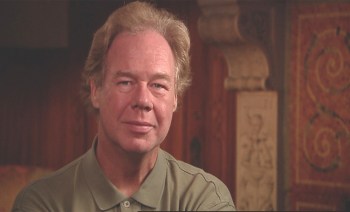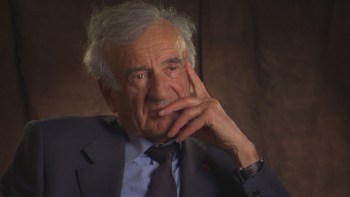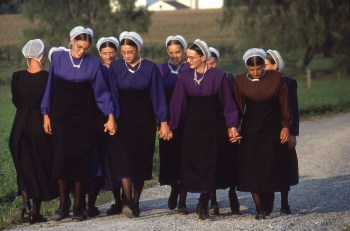An Interview with Filmmaker Martin Doblmeier
 Near the anniversary of the September 11, 2001, terrorist attacks, spiritual-documentary filmmaker Martin Doblmeier conducted a survey on his Web site. He asked whether people supported constructing a “garden of forgiveness” at Ground Zero in New York City.
Near the anniversary of the September 11, 2001, terrorist attacks, spiritual-documentary filmmaker Martin Doblmeier conducted a survey on his Web site. He asked whether people supported constructing a “garden of forgiveness” at Ground Zero in New York City.
Thousands of votes later, the results were overwhelming: Roughly 95 percent of respondents said “no.”
Although he wrote and directed The Power of Forgiveness, Doblmeier offered this anecdote in a recent phone interview without judgment. His point was that forgiveness is something that spiritual people tend to embrace as an abstract concept, but putting it into practice is shockingly difficult. For many, he said, forgiveness is the equivalent of a spare tire, something you “keep … in the back of the trunk and hope to God you never need it.
“Forgiveness is not an easy sell,” Doblmeier said. He also called forgiveness “one of the most dangerous words you can put out there. The word itself can be an affront to people.”
Despite the movie’s title, the documentary is a nuanced, realistic, and multifaceted look at forgiveness. The director said he wanted to create a work that encompassed the “inconsistencies, all the human struggle that goes on with trying to deal with this stuff. … The film itself really is laden with contradictions … different opinions on how to approach a topic.”
At one point, he said, he and his crew had more than 100 story ideas on index cards. The topic of forgiveness, he said, is “as broad as humanity and history are themselves, so that was the biggest challenge of all.”
Doblmeier stressed that he didn’t want to make a facile film, one that oversimplified one of the most difficult things that human beings do. “This is really tough,” he said. “This is not a Hallmark card. This is not seven stories that start with a little transgression, and then everybody forgives, and everybody’s happy, and it’s a sunset shot at the end.”
That’s putting it mildly. The documentary’s most complicated section deals with the emotions of people whose children died in the 9/11 attacks. Many seem to have given up their anger at the terrorists while still holding a grudge against city government for its treatment of the remains of their loved ones; they were hauled off to a dump named Fresh Kill.
“They had come to an easier peace about the act of the terrorists, in concluding that they were simply misguided young individuals,” Doblmeier said. The city was more difficult to forgive, he added, because “they did trust that the city that they love would care for the children of their city.” In other words, an offense that comes from an entity one trusts can be more difficult to forgive than a more serious transgression by a stranger.
And sometimes the most difficult person to forgive is yourself. One 9/11 victim’s mother can’t forgive herself for refusing to go to her son’s wedding. “One of the great lessons [of making the movie] … was this aspect of self-forgiveness,” Doblmeier said.
The movie certainly advocates forgiveness. It explores how forgiveness, for instance, can improve a person’s health. Studies show that the blood pressure of people who are more forgiving recovers more quickly when recounting stories of being wronged than the blood pressure of people who are less forgiving.
This is a recent field of scientific study. “There was a new moment that was happening,” Doblmeier said of the genesis of his movie. “The faith traditions had been speaking about the value and the virtue of forgiveness for centuries. But now the health community was starting to see the virtue of forgiveness.
“The intersection between those two worlds … I thought really provided a context for a really interesting and different kind of film,” he said. “Here’s a moment when these two universes are coming together, and I think that’s a hopeful sign.”
Doblmeier admits that the new science of forgiveness casts it not as a virtuous act, but as a selfish one; forgiveness becomes a tool to improve one’s health.
“You do hear on a number of occasions [that] forgiveness is all about me,” he said. “It’s all about me being better, it’s all about me letting go of the hurt and the suffering, it’s all about me finding a better quality of life.”
But forgiveness can be culturally transformational, in the sense that other people might change their behavior based on the forgiveness that they see.
The movie discusses a grade-school curriculum used to address long-held hatred between Catholics and Protestants in northern Ireland.
An academic who studies forgiveness describes the murder of his mother, and how the confessed killer was released on a technicality and never punished for the crime. “He’s asked to try and find a way to forgive where the justice system totally failed,” Doblmeier said. “His challenge is Herculean, in many ways.”
One emphasis of the movie is that justice and forgiveness are not incompatible. One section shows how the father of another murder victim has teamed up with the grandfather of his son’s killer to talk to children about forgiveness. The murderer is in prison.
“The society has an obligation to protect its people, but the heart with which it exercises that obligation is what is really in question here,” Doblmeier said.
 Author, Nobel Peace Prize winner, and Holocaust survivor Elie Wiesel discusses the concept of forgiveness in the context of the Holocaust, and stresses that the first step for forgiveness in many cases is a request for forgiveness; somebody must acknowledge that they’ve done something for which they would like to be forgiven.
Author, Nobel Peace Prize winner, and Holocaust survivor Elie Wiesel discusses the concept of forgiveness in the context of the Holocaust, and stresses that the first step for forgiveness in many cases is a request for forgiveness; somebody must acknowledge that they’ve done something for which they would like to be forgiven.
And it looks at the Amish response to the October 2006 school shooting in Pennsylvania that grabbed international attention.
That tragedy happened as The Power of Forgiveness was being made, Doblmeier said, and he and his crew had to decide whether to include it: “The Amish situation put the word ‘forgiveness’ in the headlines of newspapers all around the world, so to ignore that story would have been at some peril.”
 The Amish section highlights some of the film’s tensions, and different philosophies of forgiveness. Several people point out that forgiveness is an individual choice or process. Yet Doblmeier said that “the Amish approach forgiveness in a communal sense. … The Amish make the decision to forgive, and they stand together with each other. They did it as a community.”
The Amish section highlights some of the film’s tensions, and different philosophies of forgiveness. Several people point out that forgiveness is an individual choice or process. Yet Doblmeier said that “the Amish approach forgiveness in a communal sense. … The Amish make the decision to forgive, and they stand together with each other. They did it as a community.”
Also noteworthy is that “forgiveness is not a process” for the Amish, Doblmeier said. “The Amish didn’t have group therapy … . The forgiveness was immediate. And ultimately their hope was that their emotions would follow suit to the decision that they made. They made a decision to forgive.”
Doblmeier isn’t saying that the Amish are correct in their approach. He said that his goal was “not to provide a formula for how to apply it, but to simply raise up the word ‘forgiveness’ in a way that we don’t think it’s been raised much in the past, although it seems to be on a lot of peoples’ agendas, and it seems to integrate into a lot of peoples’ topic areas.”
The Power of Forgiveness is available on DVD from the Journey Films Web site.
This article
originally appeared, in slightly different form, in the River Cities’ Reader.

